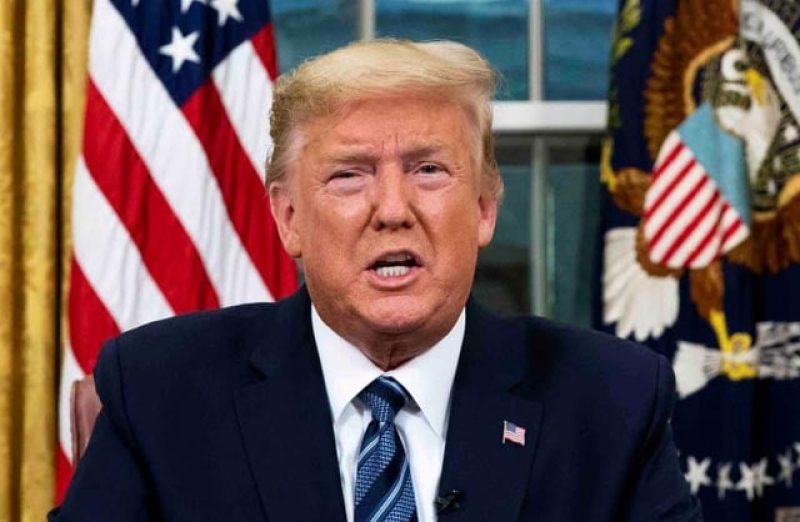- Israel Strikes Tehran with US Support Amid Nuclear Tensions |
- India Sees 9% Drop in Foreign Tourists as Bangladesh Visits Plunge |
- Dhaka Urges Restraint in Pakistan-Afghan War |
- Guterres Urges Action on Safe Migration Pact |
- OpenAI Raises $110B in Amazon-Led Funding |
Trump Tours Gulf States Amid Rising Gaza, Iran Tensions

U.S. President Donald Trump has begun a tour of key Gulf states, including Saudi Arabia, Qatar, and the United Arab Emirates, against the backdrop of escalating tensions in Gaza and growing concerns over Iran’s nuclear ambitions.
The trip comes as Israel intensifies its military campaign in Gaza following the collapse of a ceasefire two months ago. The offensive has deepened the humanitarian crisis, with continued restrictions on food, medicine, and essential aid. At the same time, Iran—long at odds with Israel and a regional rival of Saudi Arabia—appears to be edging closer to nuclear weapons capability.
While the regional security situation is urgent, Trump is expected to focus much of his visit on economic ties and personal business interests, including Trump-branded developments in the Gulf. “This is his happy place,” said Jon B. Alterman of the Center for Strategic and International Studies. “He’ll be welcomed with warmth, deals, and praise—and his family will be treated as future business partners.”
However, leaders in Riyadh, Doha, and Abu Dhabi are also deeply invested in regional security and are expected to press Trump on his position regarding Gaza and Iran.
Israel Left Off Itinerary, Raising Concerns
Notably absent from Trump’s itinerary is Israel—a move that has sparked unease in Tel Aviv. The omission is especially sensitive after Trump recently ended U.S. airstrikes on Yemen’s Iran-backed Houthi rebels. Though the group has agreed to stop attacking U.S. vessels, the deal excludes their actions against Israel. An Israeli official confirmed that the exclusion came as a surprise, especially after a Houthi missile triggered sirens in Israel shortly thereafter.
Israel is also concerned about Trump’s renewed push for nuclear negotiations with Iran—talks that Israel fears could leave Tehran with weapons potential. Hopes for a U.S.-backed strike on Iran's nuclear sites appear slim, especially amid efforts to revive diplomacy.
Meanwhile, plans for a Saudi-Israel normalization deal remain stalled. Saudi Arabia insists on meaningful concessions to Palestinians—demands unlikely to be met by Israel’s current government. Trump has publicly supported Israel’s operations in Gaza and placed full responsibility for civilian casualties on Hamas.
In a gesture of potential de-escalation, Hamas announced plans Sunday to release Edan Alexander, the last known American hostage in Gaza, as part of a proposed ceasefire and aid access agreement.
No Breakthrough Yet in Iran Talks
The status of Iran’s nuclear program remains critical. A notional two-month deadline for a breakthrough has passed, with Iran refusing demands to halt uranium enrichment. Though indirect talks via Oman continue, little progress has been made beyond the "expert level" phase.
Iranian Foreign Minister Abbas Araghchi recently visited Saudi Arabia and Qatar—likely to deliver indirect messages to Washington and demonstrate diplomatic openness. Despite crippling economic sanctions, internal dissent, and weakened proxy networks, Iran continues to signal it may pursue a nuclear arsenal if diplomacy fails.
Tensions also spiked over Trump's reported consideration of officially using the term "Arabian Gulf" instead of "Persian Gulf"—a move that provoked outrage across Iran. “This gulf has always been the Persian Gulf—and it will forever remain the Persian Gulf,” declared Ayatollah Ahmad Khatami.
Trump’s Gulf Return Evokes 2017 Flashbacks
Trump’s visit recalls his 2017 Gulf tour, which preceded a major diplomatic crisis when Saudi Arabia and several allies cut ties with Qatar. Trump initially backed the boycott but later reversed course. The rift was resolved in early 2021.
This time, Qatar is rolling out the red carpet. On Sunday, Trump confirmed he will accept a lavish Boeing 747-8 jet as a gift from Qatar’s royal family—a gesture drawing scrutiny due to the aircraft’s extraordinary value and potential future use as Air Force One.
With oil prices around $60 per barrel—lows not seen since 2021—Trump is unlikely to pressure Gulf leaders on energy policy. But he faces a far more complex challenge: navigating a region marked by entrenched rivalries, humanitarian crises, and nuclear threats.
To avoid repeating past missteps, analysts Elizabeth Dent and Simon Henderson advise Trump to “reaffirm unity among Gulf allies” while balancing diplomacy with strategic resolve.

